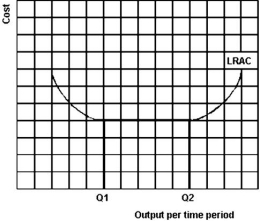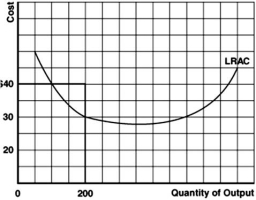Exam 7: Costs in the Long Run
Exam 1: The Economic Problem157 Questions
Exam 2: Demand and Supply: An Introduction185 Questions
Exam 3: Demand and Supply: An Elaboration139 Questions
Exam 4: Elasticity195 Questions
Exam 5: Consumer Choice144 Questions
Exam 6: A Firms Production Decisions and Costs in the Short Run179 Questions
Exam 7: Costs in the Long Run132 Questions
Exam 8: Perfect Competition172 Questions
Exam 9: An Evaluation of Competitive Markets149 Questions
Exam 10: Monopoly179 Questions
Exam 11: Imperfect Competition145 Questions
Exam 12: The Factors of Production151 Questions
Exam 13: International Trade166 Questions
Select questions type
Both short-run and long-run costs will decrease if the price of factor income increases.
(True/False)
4.8/5  (41)
(41)
What is the shape of the LRAC curve for a firm enjoying economies of scale?
(Essay)
5.0/5  (32)
(32)
Below are some cost data pertaining to Plant 1,which has total fixed costs of $1,000.Suppose that Plant 2 is exactly twice the size of Plant 1 while using (at economic capacity)twice the amount of labour and materials,and that it produces exactly twice the output.Further,assume that the prices of these inputs do not change.
 -Refer to the information above to answer this question.How much is total fixed cost in Plant 2?
-Refer to the information above to answer this question.How much is total fixed cost in Plant 2?
(Multiple Choice)
4.8/5  (35)
(35)
State whether each of the following is a short-run or long-run adjustment
a)A firm hires two more workers
b)A firm builds a new plant
c)A pizza parlor decides to add more pepperoni on their signature pizza.
d)A restaurant expands its kitchen
(Essay)
4.9/5  (47)
(47)
Below are some cost data pertaining to Plant 1,which has total fixed costs of $1,000.Suppose that Plant 2 is exactly twice the size of Plant 1 while using (at economic capacity)twice the amount of labour and materials,and that it produces exactly twice the output.Further,assume that the prices of these inputs do not change.
 -Refer to the information above to answer this question.What is the total cost of producing an output of 60 in Plant 2?
-Refer to the information above to answer this question.What is the total cost of producing an output of 60 in Plant 2?
(Multiple Choice)
4.7/5  (42)
(42)
The right size of firm is determined by the minimum point on its short-run average cost curve.
(True/False)
4.8/5  (29)
(29)
The existence of both economies of scale and diseconomies of scale would have what effect on the LRAC curve?
(Multiple Choice)
4.8/5  (38)
(38)
Suppose that a firm,operating efficiently,doubles the size of its operations and discovers that,as a result,its average cost of production has increased.What does this imply?
(Multiple Choice)
5.0/5  (35)
(35)
 -Refer to the graph above to answer this question.Suppose that the firm is producing an output between Q1 and Q2.All of the following statements,except one,are correct.Which is the exception?
-Refer to the graph above to answer this question.Suppose that the firm is producing an output between Q1 and Q2.All of the following statements,except one,are correct.Which is the exception?
(Multiple Choice)
4.8/5  (31)
(31)
Demonstrate graphically and explain verbally the concepts of economies of scale,constant return to scale,and diseconomies of scale.
(Essay)
4.8/5  (33)
(33)
Suppose that a firm's output increases from 500 to 600 units and its total cost increases from $50,000 to $72,000,and if the price of inputs and technology remain unchanged,calculate the change in average total cost and state whether constant returns to scale,economies of scale or diseconomies of scale exist in this case.
(Multiple Choice)
4.9/5  (29)
(29)
Table 7.2 contains long-run cost data for three different firms.Is each of these firms experiencing economies,diseconomies or constant returns to scale?
Table 7.2

(Essay)
4.8/5  (39)
(39)
 -Refer to the graph above to answer this question.Could this firm produce an output of 200 at an average total cost of $20?
-Refer to the graph above to answer this question.Could this firm produce an output of 200 at an average total cost of $20?
(Multiple Choice)
4.9/5  (29)
(29)
Suppose it takes 30 workers and 120 units of capital to produce 300 trucks a day.How much labour and capital is involved in producing 900 trucks a day if the firm experiences constant returns to scale?
(Essay)
4.9/5  (36)
(36)
If we know that a firm is experiencing diseconomies of scale,which of the following statements is true?
(Multiple Choice)
4.8/5  (45)
(45)
Below are some cost data pertaining to Plant 1,which has total fixed costs of $1,000.Suppose that Plant 2 is exactly twice the size of Plant 1 while using (at economic capacity)twice the amount of labour and materials,and that it produces exactly twice the output.Further,assume that the prices of these inputs do not change.
 -Refer to the information above to answer this question.What comment can be made in reference to returns to scale between Plants 1 and 2?
-Refer to the information above to answer this question.What comment can be made in reference to returns to scale between Plants 1 and 2?
(Multiple Choice)
4.9/5  (36)
(36)
Suppose prices and technologies are held constant.State whether each of the following scenarios shows increasing returns to scale,constant returns to scale or decreasing returns to scale.
a)Percentage change input is greater than the percentage change in output.
b)Percentage change input is equal to the percentage change in output.
c)Percentage change input is less than the percentage change in output.
(Essay)
4.9/5  (40)
(40)
Which of the following statements is correct if a firm's capacity output increases from 300 to 600 and its total costs rise from $40,000 to $78,000?
(Multiple Choice)
4.8/5  (37)
(37)
Showing 41 - 60 of 132
Filters
- Essay(0)
- Multiple Choice(0)
- Short Answer(0)
- True False(0)
- Matching(0)